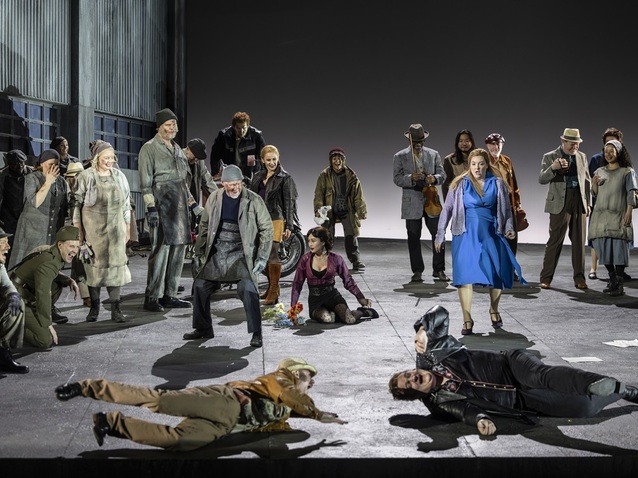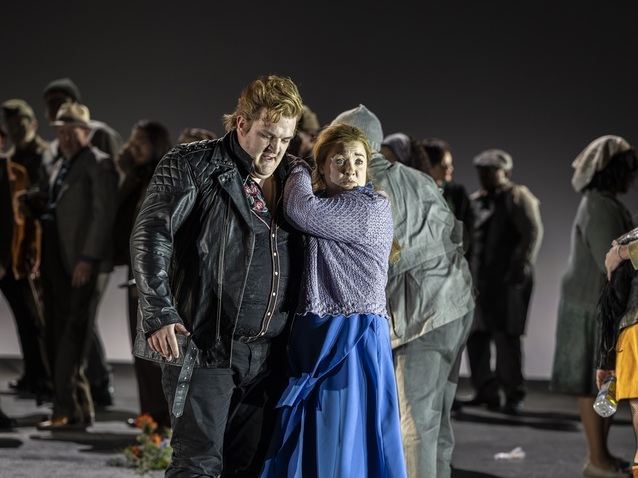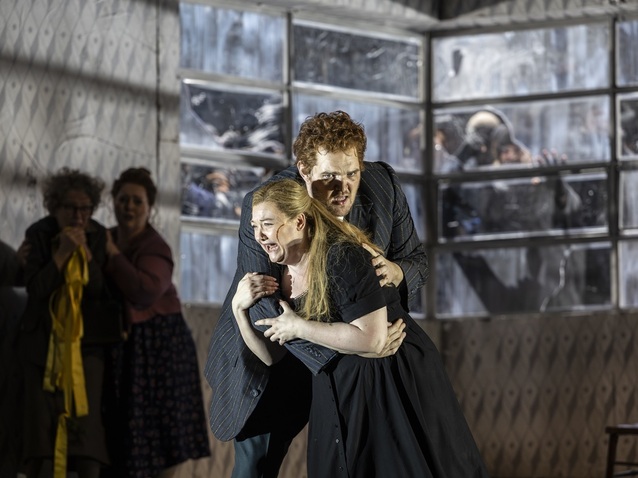 © Ellie Kurttz
© Ellie Kurttz
Jenůfa, which premiered in Brno in 1904, is an opera in three acts by Leoš Janáček to a Czech libretto by the composer. It is based on the play Její pastorkyňa by Gabriela Preissová, and is one of the very first operas to be written in prose. Set in a Moravian village in the nineteenth century, the plot concerns a series of tangled relationships, deriving from the fact that two brothers died leaving behind both children and stepchildren. The elder brother married a widow, and thus became stepfather to her son Laca, before having Števa with her. The younger son married twice, and had Jenůfa with his first wife. All of the wives have also died, with the exception of the Kostelnička who was the younger brother’s second wife and hence is Jenůfa’s stepmother. Custom dictates that Števa alone will inherit the family mill, and that Laca and Jenůfa must consequently earn their livings.
Jenůfa is in love with Števa and secretly pregnant with his child, although he is casual towards her to say the least. Laca is in love with Jenůfa and, being bitter at his half-brother’s favoured position and the attention Jenůfa shows him, slashes her cheek in a fit of rage. Once the baby is born, the Kostelnička keeps it and Jenůfa out of the sight so that no one knows about it. When Števa finally visits, after the Kostelnička demands he take some responsibility, he agrees to provide money in secret, but insists that no one must know the baby is his. He no longer loves Jenůfa since Laca spoiled her beauty, and is now engaged to marry Karolka, the Mayor’s daughter.
The Kostelnička’s next hope is that Laca will marry Jenůfa, but when she explains the situation to him, he is disgusted at the thought of taking Števa’s child under his wing. Fearful that Jenůfa will be left with no husband, the Kostelnička tells him the baby is dead and then feels compelled to make the lie true by taking it from the house while its mother sleeps. When Jenůfa subsequently awakes, the returning Kostelnička tells her the baby has died. Laca then comforts Jenůfa, and asks that they spend the rest of their lives together.
On Laca and Jenůfa’s wedding day the following spring, the body of the baby is discovered in the millstream under the melting ice. Jenůfa immediately says the baby is hers, and the village prepares to exact immediate justice against her until the Kostelnička proclaims the crime to be hers alone. Hearing the whole story, Jenůfa forgives her stepmother, and while the Kostelnička is taken to jail, Jenůfa and Laca are left alone. Jenůfa says she cannot expect Laca to marry her now, but he replies that he wishes to spend the rest of his life with her.
Although it is difficult to dispute that the Kostelnička committed a heinous crime, in the context of the opera it becomes easy to understand her desperation. Her fear is that Jenůfa will be left all alone, and the problem is a society that will judge a single mother and the men who will readily turn their back on a woman with a child, including the one who fathered it. Indeed, when at the end of Act II the Kostelnička hears Laca saying he wants to be with Jenůfa, when he had been so hostile when the baby was alive, one can see why she could convince herself that she had acted for the best.

John Findon, Jennifer Davis, ENO’s Jenufa 2024 © Ellie Kurttz
David Alden’s 2006 production for English National Opera updates the action to an isolated industrial estate in the Eastern Bloc in the 1950s, judged by Števa’s Teddy Boy appearance. The mill is now a factory, although the fact that in Charles Edwards’s set a wall only runs down one side of the stage, with a white screen appearing behind, suggests that the space should not be taken entirely literally. The stage can feel rather bare, though that is surely deliberate, but it does create a large space for all of the members of the community to fill. The dynamic they bring to the evening, attributable in large part to the choreography of movement director Maxine Braham, is excellent, and it actually has an effect on how we view many of the characters. When the Kostelnička (which means Sacristan) first appears she reprimands everyone for singing and dancing, which normally makes us see her as a Puritanical killjoy. However, since, on this occasion, their antics have led Jenůfa and Števa and several other couples to roll about the floor together, it is not necessary to see her as being so extreme in her attitudes when she intervenes to stop the revelries.
This, in turn, helps the Kostelnička to seem more real, and less caricatured, and Susan Bullock makes her a particularly multi-faceted figure. She does not command the stage quite as completely as would be ideal in Act I, but that is a difficult task as her very role is to disrupt the mass activity with ‘stillness’. As soon as we reach Act II, however, she is superb as we feel for ourselves the pain and anguish she experiences every minute of the day. Backed by Bullock’s rich and multi-faceted soprano, it is easy to see how the Kostelnička is ultimately a self-sacrificing character because her focus the whole time is on Jenůfa’s welfare and happiness. Her approach might be coloured by her old-fashioned values to an extent, but Števa and Laca’s hostile reactions to the child are certainly not figments of her imagination. It is also noticeable that, long before her crime is discovered, she knows she is sacrificing her ‘eternity’ in order to secure Jenůfa’s future, and her performance is particularly powerful when she returns to the house shaking after having dispatched the baby.
The manner in which Jennifer Davis as Jenůfa endures her various hardships reveals the character’s ultimate innocence, and her beautiful soprano is well suited to the role in being extremely full and nuanced, while still feeling highly fresh. On his ENO debut, Richard Trey Smagur as Laca displays a notably warm and accomplished tenor, and makes it entirely believable that the same character could be ultimately caring and yet capable of such violence. John Findon as Števa asserts his immensely powerful tenor to brilliant effect, as he immerses himself in playing the brash popular guy who is actually such a coward that he will attempt to deflect criticism by blaming others for how they have treated him.

Jennifer Davis, Richard Trey Smagur, ENO’s Jenufa 2024 © Ellie Kurttz
Acts II and III offer an angular, Expressionistic interior that is entirely sealed off from the outside world as the Kostelnička tries to hide Jenůfa and her baby. Over the course of the two acts it gradually opens up, beginning with Jenůfa taking down some of the window boards and ending with the entire set splitting in two as the crowds rush in and reveal just how impossible it is to keep anything secret. This is generally effective but there are a few missteps along the way, such as Laca’s throwing of a chair, which feels too clichéd and deliberate an action. Similarly, the chorus’s movements and gestures as they first try to attack the Kostelnička, and then fall silent as they are moved by her dignity, seem too stylised. The whole point of a chorus in this instance is to portray the strength of emotion in the masses, so the movement does not need to be entirely realistic, but the sight of two people trying to hold them all back feels just a little too comical for the occasion.
For the most part, however, the interaction between characters is strong as illustrated by the meeting of Števa, Karolka (Segomotso Masego Shupinyaneng), Laca and Jenůfa on the morning of the wedding. As Karolka talks nineteen to the dozen, oblivious to all that has preceded this moment, the others’ faces skilfully reveal awkwardness combined with a desire to be understanding and conciliatory. Keri-Lynn Wilson’s conducting is superb as she delivers a beautifully balanced account of Janáček’s enigmatic score, achieving a litheness throughout while also instilling a sense of monumentality at the requisite times. The opening night performance was dedicated to the memory of ENO regular Keel Watson, who sadly died last November and was set to play the Mayor in this production. His final appearance for the company was as Private Willis in Iolanthe in October 2023, and he will be sorely missed.
By Sam Smith
Jenůfa | 14 - 27 March 2024 | London Coliseum
the 16 of March, 2024 | Print
Comments